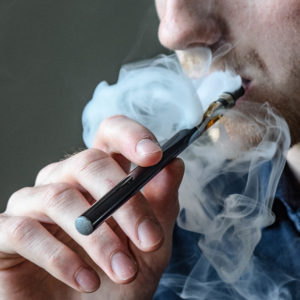Several U.S. senators recently wrote to Dr. Stephen Hahn, commissioner of the Food and Drug Administration (FDA), that it is imperative that his agency ensures that vaping products are properly regulated.
New Hampshire U.S. Sens. Jeanne Shaheen and Maggie Hassan joined a bipartisan coalition in calling on the FDA to take action. According to the letter, the senators rightfully expect Hahn will ensure that the agency reject e-cigarette product applications that do not protect the nation’s public health.
January marked the release of the Trump administration’s seemingly final policy on tobacco and vaping products. In addition to increasing the tobacco age from 18 to 21, the FDA chose to remove a swath of pod-based products — sold in gas stations and bodegas —from the market.
This restriction was only noted as temporary, with health officials citing the existing mandates of the Tobacco Control Act of 2009.
In light of media reports from outlets like the Wall Street Journal and The New York Times, many opponents of the vaping industry —and nicotine consumers — began campaigns to target flavored disposable vape products and push for stricter policies across the country. Only tobacco and menthol-like flavors are to remain in this product format.
“As head of the FDA, your responsibility is to the American public, including, and most important, our nation’s children,” Shaheen and Hassan wrote with the other senators. “As you know, five million children are now vaping, including one in four high school students — an increase of 135 percent over the past two years alone… we do not believe that a product that has increased or is likely to increase youth use of nicotine or tobacco can meet the public health standard required under the [law].”
I firmly respect the concerns of Sens. Shaheen and Hassan and other members of Congress, including: Sens. Ron Wyden (D-Ore.), Elizabeth Warren (D-Mass.), Lisa Murkowski (R-Alaska), and Mitt Romney (R-Utah).
“When looking at the changing e-cigarette marketplace, including the proliferation of products that use nicotine salts, JUUL-like products, and disposable flavored products, it is virtually certain that many products have entered illegally. FDA will have failed to uphold its responsibility to protect public health if the May 12 deadline is enforced in the same manner as the deeming rule,” the senators further noted in the letter.
The senators blame the Trump administration for failing to completely remove flavored vapes of all sorts from the market. Such a belief, though, is no more misguided than President Trump’s attempt to create an entirely new agency focused on tobacco regulation.
Note: The industry already faces the May 12 deadline because of prior litigation and the nature of the marquee 2009 tobacco law. A federal district court holds that the FDA is in a position to enforce product applications and remove products indefinitely until approval is reached.
Sadly, these senators find this not to be enough action.
As outlined by the letter, this bipartisan coalition shares the belief that leaving a limited number of products on the market still poses an inherent public threat. This is irresponsible reasoning that has long been applied to the war on drugs and drug users.
Though Trump is still a bad actor against the various industries, his FDA at least recognizes the importance of protecting as many jobs as possible. Unfortunately, the sentiment in the administration is still emboldened by the misinformed tripe these lawmakers show.
Worldwide, respected public health bodies and national governments have seen reason to endorse vaping as a safer means for nicotine delivery. Therefore, these products should be regulated and referred to as risk-reduced, or modified risk products, which demonstrate actual benefits to the wider public health.
Shaheen, Hassan and their colleagues must recognize actions of other countries’ governments.
By demanding that the FDA turn down scores of applications of products that are sure to be designed for consumer safety in labs approved by industry and public regulatory bodies, these senators collectively prop up the false narrative that e-cigarettes are dangerous — or more so than combustible cigarettes.

